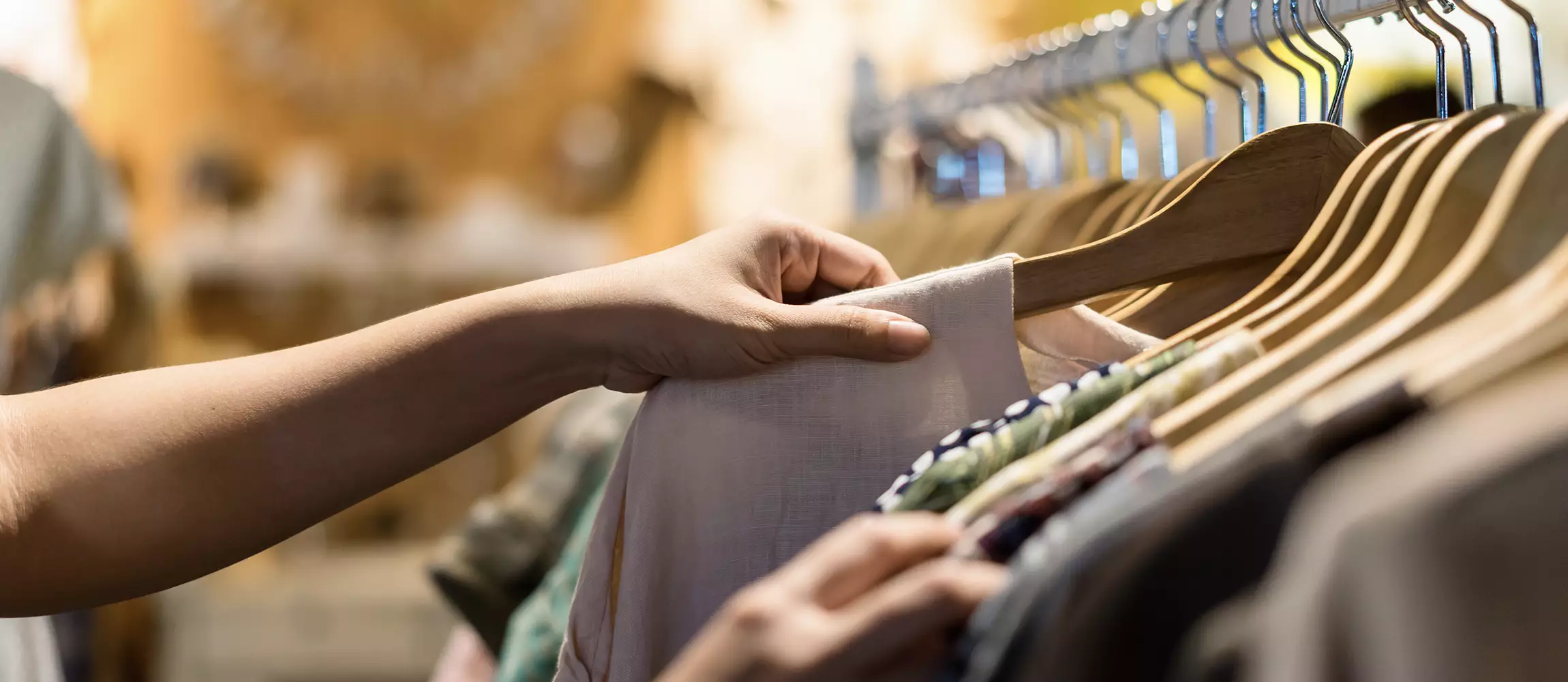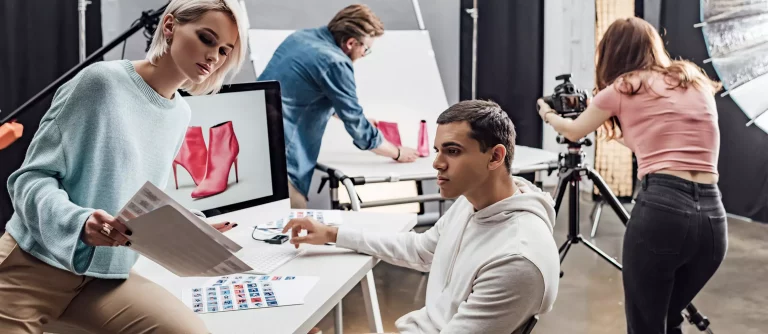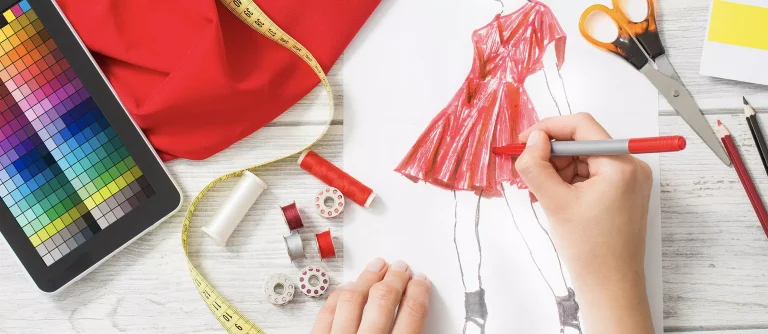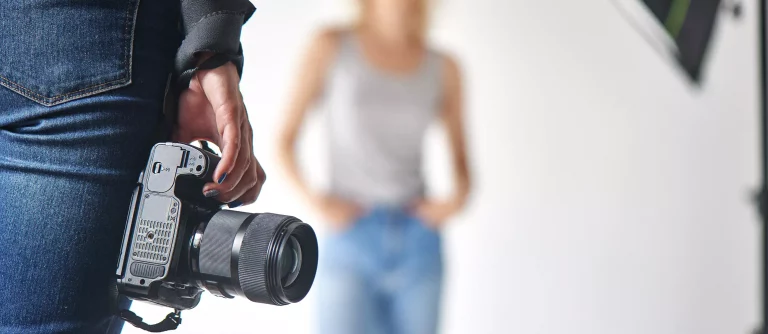How To Become a Fashion Buyer
Have you always wanted to pursue a career in fashion? There are many different roles within the industry, each requiring different skills. For example, if you’re more analytical and business-minded but still want to be part of the fashion industry, a career as a fashion buyer might be perfect for you.
There are several ways to enter this profession. Here is a closer look at how to become a fashion buyer.
What is a fashion buyer?
A fashion buyer is someone who chooses and plans purchases for a clothing retailer. It’s a role that requires you to have a good eye for picking out the right styles, as well as an analytical mind that helps you choose out trends with great potential before they go viral.
Being a fashion buyer involves analyzing past sales trends and finding out what has historically experienced great sales. It would also help if you had a knack for looking out for recent or current fashion trends that have a high probability of doing well in the future.
You will probably do a lot of traveling, attending runway shows every season, and meeting with different designers to find out what they’re planning. These trips will allow you to keep a finger on the fashion industry’s pulse so you can make well-informed purchasing decisions on behalf of your employer.
What Does a Typical Workday for a Fashion Buyer Look Like?
Fashion buyers are very busy people. If you succeed in becoming one, you can expect to have busy days with many tasks, each presenting its own set of challenges. A typical workday for a fashion buyer might include the following activities:
Analyzing store sales
When you arrive at work, one of your priorities will be looking at the previous sales for different stores. Some of them will have higher revenues than others, and it will be your job to find out why.
Was it because some had promotions while others didn’t? Was it due to slight differences in the displays that boosted sales?
You will also want to break down the sales for each store, finding out what sold and in what quantities in as much detail as possible. How many dresses, shirts, ties, and so on sold at each store?
You may be working alone or as part of a larger team. If your employer has many stores, you’ll probably work in a team to analyze the sales. You must grasp the fundamental concepts of retail math, such as gross and net product margins.
You will hone these skills on the job, as each retailer does things slightly differently, but you must demonstrate the capacity to learn well if you’re going to succeed in this workplace.
Attending buyers’ meetings
Buyers’ meetings involve fashion buyers from different retail stores. Usually, these meetings serve as networking opportunities and forums for fashion buyers to exchange ideas and discuss what’s coming up for the next season, such as colors, sizes, and styles.
Other things that can get discussed, especially among retailers that work together, are production and distribution details.
Basic management work
In a sense, as a fashion buyer, you will play both the roles of artist and scientist for your company. You need to be fashion savvy, as well as comfortable with math and business.
On a typical day, you need to ensure the buying process is going smoothly, including writing up what’s being bought and creating and approving budgets. You will need to keep track of inventory using spreadsheet software, like Microsoft Excel.
You will do lots of talent scouting on the fashion side of things, identifying the latest brands and trends. Some of this will be done online, on platforms like Instagram, while more happens in person at networking events like fashion shows.
One minute, you might be visiting a budding designer to see what she has to offer. The next minute you might need to make a PowerPoint presentation explaining to upper management why purchasing that designer’s designs was the right decision.
Sourcing and purchasing fabric for brands
Fashion buyers don’t always have to deal with the retail side of things. If your employer is a clothing retailer and a fashion brand, part of your job might involve sourcing fabric and materials for them.
Will I Like Being a Fashion Buyer?
As mentioned above, being a fashion buyer involves wearing many different hats. Not only will you need to have a good understanding of fashion and style, but you will also need to understand margins and be great at managing sales.
Your role will cover such diverse areas as planning and forecasting, inventory management, negotiating, and developing relationships.
While a fashion buyer’s role is often glamorous, it is not easy. You will have to bring your A-game to work every day to succeed. If all the above sounds like something you enjoy, then maybe being a fashion buyer is a good career plan.
Above all, however, you need to be passionate about fashion and business. Considering how demanding the job is, it will probably take over a large part of your life. It may well become your life. If you’re not passionate about it, you might end up miserable doing it.
The fabric chosen for a collection can easily be the deciding factor in the profitability of that collection. Designers often have to work with whatever materials are available in a particular season.
Luxury brands rarely ever weave fabric. Instead, they make orders from fabric manufacturers for specific materials, colors, dyes, and prints. For sportswear companies, such as Nike, it might make more sense to create fabrics and materials for quality control purposes. However, they often have an extensive network of suppliers that sell them fabric at wholesale quantities and prices.
As a fashion buyer, you might need to develop good relationships with these manufacturers and suppliers, securing reasonable prices and high quality, and better trading terms for your employer.
Characteristics and skills of a fashion buyer
Like with any other job, there are some skills and characteristics that are strong predictors of whether a person will enjoy being a fashion buyer or not. See if you can recognize any of the below in yourself. If you can relate to many of them, this might be the right job for you.
A strong intuition for fashion
To succeed as a fashion buyer, you need to have a great sense of fashion and the ability to identify trends and pieces that are likely to be best-sellers across seasons, even if they might not be popular at the moment. This kind of intuition can be a huge determining factor in your success or failure.
Stress tolerance and organizational skills
As a fashion buyer, you will wear many hats and face many challenges. You have to absorb a lot of information, process it, and make the right decisions based on that information. For that purpose, you need to have organizational skills. You will also be working with many different people and taking on a slew of tasks every week. The ability to remain level-headed, even under a large stress-load, is invaluable here.
Negotiation skills
Are you good at negotiating and driving arrangements in your favor? You will need to apply that skill often as a fashion buyer. A big part of your job will be securing favorable terms with manufacturers and suppliers. That means getting quality products at excellent prices. A lot of your success as a fashion buyer, especially on the business side of things, will come down to your ability to negotiate effectively and frequently.
Analytical skills
As a fashion buyer, you will make informed decisions that increase the profitability of your employer. To make these decisions, such as when making purchases, you need to analyze different factors. These include quality, price, delivery costs, marketability, and so on.
The better you are at constructing useful models for making complex decisions, the more successful you will be at making a profit for your employer.
Social skills
A lot of your work as a fashion buyer will involve dealing with other people. You should, therefore, be capable of building a strong rapport with people. Social skills are essential to help you build relationships with suppliers, designers, other fashion buyers, and your coworkers.
Seeing as you will be representing your employer in many situations, you must demonstrate the ability to maintain a good reputation on their behalf.
Why You Might Not like Being a Fashion Buyer
There are many reasons you might enjoy being a fashion buyer, and there are also many cons about the job that might discourage you from wanting to pursue it.
As mentioned above, there are essential skills and characteristics that you need to have to excel at and enjoy being a fashion buyer. Each of these has a dark side.
If you don’t have the skill or find it cumbersome to develop, this might not be the best career. Some of the most common cons of being a fashion buyer include the following:
You will work long hours
As mentioned earlier, a fashion buyer career is a demanding one and can easily dominate your life. As a fashion buyer, you should expect to work long hours every day. Often, this can lead to 60+ hour work weeks.
The pay is often commensurate with the work level, but that doesn’t mean the hours will be any shorter if you get paid less. If you don’t like the idea of working long hours at a job, then a fashion buyer career may not be the right one for you.
It is a high-pressure job
The vast majority of the decisions you make on behalf of your company as a fashion buyer will be critical to the short and long term success. If you make a large purchase of a particular design anticipating it trending, you may bankrupt your employer if the clothes don’t sell.
There is, therefore, a lot of pressure involved in a fashion buyer job. This reason is why it is crucial to have the ability to maintain a level head in this career.
Tough and frequent negotiations
Securing favorable trade terms isn’t as simple as meeting with stakeholders at a single meeting and coming to a swift agreement. It will often involve several meetings over many months before you arrive at a price and make a deal. You should always have your wits about you and keep your negotiation skills sharp. If you don’t like the idea of negotiating so often and under such challenging conditions, then maybe this isn’t the right job for you.
You need a passion for fashion to succeed
Being a fashion buyer isn’t just a day job. It’s not something you do to pay the bills. This job will most likely be a key part of your life. You need to have a passion for it and have no qualms about dedicating your life to being a great fashion buyer.
If you have no passion for fashion (both the aesthetic and business sides of it), then it might be best to forego this career in favor of one that you are passionate about.
Typical Schooling for a Successful Fashion Buyer
Your first step toward becoming a fashion buyer is to get the right kind of education. Most employers want candidates to have at least a bachelor’s degree in fashion merchandising or related fields. They should also have between two and five years of merchandising experience. As a fashion buyer, you will also need to be proficient in spreadsheet and inventory management software.
Education
Let’s start with the degree. Most employers will expect you to have completed at least a bachelor’s degree in fashion design, fashion merchandising, or a related marketing or business degree to consider you for employment.
These programs will provide you with the necessary education and skills to prepare you for the job market. Some of the most critical skills and subjects you will learn through such degrees include accounting, trend forecasting, statistical analysis, marketing, economic theory, and consumer behavior.
While in school, it is an excellent strategy to participate in as many internships as you can. Many colleges that offer degrees related to the fashion industry also offer extra credits to students who participate in internships in the retail sector.
You should also seek to develop specific product knowledge. Potential employers will consider it a bonus if you can demonstrate an understanding of their sector’s products.
Experience
The next step to becoming a fashion buyer is to gain up to five years of experience in an entry-level position. Such positions include junior buyer, purchasing clerk, and associate planner. For the most part, you will be the assistant to a fashion buyer, following them around and doing most of the grunt work for them.
This job will help you become familiar with the various tasks and challenges of being a fashion buyer. You will learn about different sales and inventory management systems, trend analysis and forecasting, negotiations, and the impact of macroscopic economic events on the fashion industry.
The best formula for success is to learn as much as you can and stay on top of industry trends. You need to continually educate yourself about the latest products and collections and network as much as possible with other industry professionals.
Attend as many fashion shows and other industry events as you can. Many of the contacts you collect at these events will be future employers, suppliers, and coworkers.
Best Fashion Buyer Colleges
Considering how complex a career as a fashion buyer is, you must get the best education to prepare you for the job. There are a lot of schools that offer courses related to fashion buying. However, we will look at the top three for in-person and online colleges.
In-person colleges
If you want to attend a campus, here are your best options.
Fashion Institute of Technology (Annual cost: $35,693)
The Fashion Institute of Technology has consistently been one of the top fashion schools in the world. Its courses include fashion, design, art, business, and communications, and it has a rigorous curriculum and a commitment to industry partnerships, experiential learning, and research.
The Fashion Institute of Technology offers both an associate degree and a bachelor’s degree in fashion business management. Its programs include offerings in buying and planning, fashion management, product development, financial and assortment planning, internships, and study abroad programs.
Auburn University (Annual cost: $31,590)
Auburn University has one of the oldest accredited art departments in the United States. It is also a charter member of the National Association of Schools of Art and Design.
It has undergraduate programs covering apparel merchandising, design, and production management. You will learn, among other things, merchandise planning and control, accounting, global consumer culture, economics, marketing, and fashion analysis and forecasting.
With a more science-like approach to fashion buying, a degree program here will give you a firm foundation of technical knowledge to build your career as a fashion buyer.
Kent State University (Annual cost: $20,308)
Kent State University has a long-standing tradition of excellence in the arts, including art history, studio disciplines, and, of course, fashion.
The university offers a bachelor’s degree in merchandising, including education in such fields as retail operations, fashion theory, fashion buying and management, and fashion forecasting and promotion.
They also have a study abroad program with opportunities to travel to various fashion capitals, including New York City, London, and Florence.
Online colleges
If you would instead like to study via the internet, here are your best choices.
Central Michigan University (Annual cost: $14,624)
Central Michigan University educates more than 7,000 students through its online programs. They offer a bachelor of science in fashion merchandising and design.
This degree teaches about the established and emerging technologies in the industry. There are two specializations: product development and visual merchandising. The visual merchandising discipline is the one for students interested in a fashion buying career, as it teaches about consumer behavior, retail management, and the psychology of in-store displays.
Johnson and Wales University (Annual cost: $50,454)
Johnson and Wales offers a bachelor of science degree in fashion merchandising and retailing. The program provides a balance between the career’s technical and creative aspects, focusing on the key strategies required to track and anticipate emerging industry trends. They also offer online learners the opportunity to add a minor in human resource management to expand their career opportunities.
Southern New Hampshire University (Annual cost: $30,756)
The Southern New Hampshire University offers a bachelor of science degree in fashion merchandising management. Their degree focuses on developing competencies in five key areas: retail theory, merchandise planning, industry trend identification, textile purchasing, and qualitative and quantitative data analysis.
It is a comprehensive course that teaches students how to address consumers, retailers, vendors, and investors.
Can I skip college and teach myself how to be a fashion buyer?
Perhaps you don’t like the idea of going to a school and receiving formal education for four years to become a fashion buyer, or it simply isn’t feasible for you to do so at the moment.
The good news is that there are ways around it. Despite the considerable amount of technical and analytical skills required to excel at a career as a fashion buyer, one can still learn it without going to a formal school. Here are three non-traditional paths to becoming a fashion buyer.
Read a good book on the subject
The good news is that the larger part of the literature on fashion merchandising is for students. This fact means you can start from the basics and build your knowledge by reading.
By picking a good textbook on the topic, you can learn what a buyer is, what they do, and different skills, such as marketing, design, and merchandising.
The more you know at a technical level, the more likely you will make the right decisions once you’re on the job. A good book will give you a firm foundation. Once you have that, you may be able to land an entry-level position.
Take a short course online
In case the idea of reading a book doesn’t sound very appealing to you, the other option is to take a short course online. These are cheaper (sometimes free) than full-fledged university courses, don’t take as long, and will give you a quick way to cover all the basics. Many of these courses last a few hours and give you all the information you need to build a firm foundation in fashion buying.
Get as many internships as you can
Internships are arguably more important than your university degree in this industry. Try to look for internships at as many retailers as you can. Then focus on learning as much as possible while you’re there.
Be like a sponge, and soak up as much as you can. Multiple internships will also help you network and gain useful contacts that could turn into actual paying jobs. As vast as it seems from the outside, the fashion industry is small enough to know everyone, and recommendations travel faster and farther than job applications.
Which Software Programs do Fashion Buyers Use?
The essential software for fashion buyers is ERP (Enterprise Resource Planning) software. This software handles, among other things: order and inventory management, order fulfillment, product and customer management, and accounting and finance. Here are the top five recommendations you can learn while training for a career as a fashion buyer:
1. AIMS360
AIMS360 is a cloud-based ERP that offers complete business management to help with wholesale, retail, and distribution. Features include product tracking, styles management, inventory and order management, B2B (business-to-business) and B2C (business-to-consumer) integrations, and the ability to connect to third-party software, including Shopify and Quickbooks.
2. ApparelMagic
ApparelMagic is a unique ERP for fashion businesses. It includes accounts management, order management, sales, styles, and shipping.
3. Logic AFS
Logic AFS is a general-purpose ERP that enables the automation and scalable management of organizational processes such as sales, retailing, distribution, and production. It includes features for inventory management, centralized merchandising, and POS (point-of-sale) management.
4. Cantel Apparel ERP
Cantel is a unique ERP made for the footwear and apparel industries. It includes trim and label kits for private labels, KPI (key performance indicators) dashboards, customer order management, catalog creation, and notifications sent directly to representatives and teammates for immediate follow-up.
5. WFX
WFX is a cloud-based ERP dedicated to the fashion and apparel industry. This software includes style information (design specs, grading, labels, and packaging), order tracking integrated with Google Maps, fabric management, and design collaboration.
What are the best blogs and influencer accounts to follow?
Here are some of the best online resources for fashion buyers.
This blog is ideal for getting general industry information, including advice, latest trends, and peeks behind the scenes.
Stitch Fix is a blog with a focus on style tips and favorite looks. It also includes a podcast where they discuss the latest fashion trends around the world.
Superdry contains interviews with famous and trendy fashion influencers. These include designers, DJs, athletes, models, dancers, and entrepreneurs, among others.
Five ways to break into the fashion buyer industry
Here are five ways to get started on the fashion buying career path.
Get online
The fashion industry has an overwhelming presence online, and part of the way to break into it is to have an online presence yourself. Employers will be interested in seeing any work you’ve done on your own before they consider hiring you. Create a portfolio website to show off your best work and tell the world about yourself.
Attaching a blog to the site where you write about your ideas related to the fashion industry will also boost traffic and visibility. You can quickly build a website using website builders like WordPress, Squarespace, and Wix.
Get social
Getting online goes well beyond just having a website. Social media will be part of your journey toward a fashion buyer career. Join Instagram, Linked In, Pinterest, Facebook, and Twitter. You don’t have to join all of them, but you should join at least one or two and build a substantial presence and reputation as someone who loves fashion on the platform. This step makes you more visible to potential employers in the space.
Become an apprentice
As mentioned earlier, internships are arguably more important than your degree major when securing a job as a fashion buyer. Find someone who can teach you on the job and offer to work for free. This step will give you valuable experience that will make employers more likely to hire you.
Continue learning
Fashion is a fluid industry, and trends are always going in and out of vogue. To stay ahead of the competition, you should never stop learning. Find paid tutorials and short courses or free YouTube videos that help you learn more about the industry and career.
Keep grinding
Nothing good comes easy. You will likely experience your fair share of failures early on and suffer much demotivation along the way. Don’t let any of that discourage you. Understand that these are just hurdles to cross along the way, and they are part of what makes the journey enjoyable.
FAQ
Here are the most common questions you might have before you decide to embark on this career path.
How much money do fashion buyers typically make?
According to PayScale, the median fashion buyer earns an annual salary of $69,000, with bottom earners making $38,000 and top earners making $101,000.
What do you study to be a fashion buyer?
Any degree in fashion design, merchandising, management, or a related business or marketing degree should offer a good foundation for starting a career as a fashion buyer.
Is fashion buying a good career choice?
That depends on what kind of career you want and what your strengths are. If you are both creative and analytical, don’t mind working long hours, and have a burning passion for fashion, being a fashion buyer is an excellent career choice.
Are there a lot of job openings for fashion buyers?
According to the Bureau of Labor Statistics, there will be a 6% decrease in jobs for fashion buyers and purchasing agents between 2018 and 2028. This industry is small, so there are a few jobs available (and a lot of competition for them). The best way is to start by doing lots of internships and gather contacts that could turn into future jobs.
What is the best website to find fashion buyer job listings?
Most of the best fashion buyer jobs come through referrals from your contacts. Doing lots of internships and having a robust online presence can help you get that. However, you can also find job listings at Indeed, SimplyHired, Ziprecruiter, and Glassdoor, among others.
What are some big companies that hire fashion buyers?
Many large companies offer fashion buyer jobs, including Anna Zuckerman Luxury, Macy’s, H&M, American Dream, etc. For an idea about some of the companies hiring, visit the job listings above.







